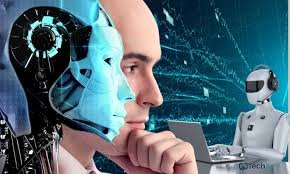AI and robotics are two of the most transformative forces in technology today. They are revolutionizing industries, redefining work, and reshaping our daily lives. As we navigate the 21st century, their impact on innovation is profound and multifaceted. Let’s explore how AI and robotics are driving the future of innovation.

The Convergence of AI and Robotics
AI, or artificial intelligence, refers to the simulation of human intelligence in machines programmed to think and learn. Robotics involves the design, construction, and operation of robots—machines capable of carrying out tasks autonomously or semi-autonomously. The intersection of these two fields is creating a synergy that is accelerating technological progress.
AI enhances robotics by providing machines with the ability to learn from data, adapt to new situations, and make decisions in real-time. Robotics benefits AI by giving it a physical presence, allowing for practical applications in the real world. This convergence is giving rise to intelligent robots that can perform complex tasks, from autonomous vehicles to sophisticated manufacturing systems.
Transforming Industries
1. Manufacturing
The manufacturing sector is one of the most visible beneficiaries of robotics and AI. Robots have been used in manufacturing for decades, but recent advancements have led to the rise of smart factories. AI-driven robots can now perform intricate tasks with high precision and flexibility, such as assembling electronics or handling delicate components. Predictive maintenance powered by AI is also minimizing downtime by anticipating equipment failures before they occur.
These innovations are not only improving efficiency but also enabling the production of highly customized products. Companies can now offer bespoke products with shorter lead times, meeting the growing demand for personalization.
2. Healthcare
In healthcare, AI and robotics are making significant strides. Surgical robots, such as those used in minimally invasive procedures, are becoming more precise and reliable. AI algorithms analyze medical images to assist in diagnostics, detect anomalies, and predict patient outcomes. This combination of robotics and AI is leading to better surgical outcomes, more accurate diagnoses, and personalized treatment plans.
Additionally, AI-driven robotic systems are being used in rehabilitation, providing patients with tailored exercises and monitoring their progress in real-time. The integration of AI in drug discovery is also accelerating the development of new treatments by analyzing vast datasets and identifying potential compounds.
3. Transportation
The transportation industry is undergoing a revolution with the advent of autonomous vehicles. AI is at the core of self-driving technology, enabling vehicles to navigate, make decisions, and adapt to changing road conditions. This innovation promises to reduce accidents, ease traffic congestion, and provide mobility solutions for those unable to drive.
Robotics are also enhancing logistics and supply chain operations. Automated warehouses and delivery drones are streamlining inventory management and last-mile delivery, making supply chains more efficient and responsive.
Redefining Work and Labor
The rise of AI and robotics is transforming the nature of work. Automation is handling repetitive and dangerous tasks, freeing humans to focus on more complex and creative endeavors. However, this shift also raises questions about the future of employment.
1. Job Displacement and Creation
While some jobs are being automated, new opportunities are emerging. The demand for AI specialists, robotics engineers, and data scientists is growing. There is also a need for professionals to manage, maintain, and troubleshoot automated systems. Reskilling and upskilling will be crucial for workers to transition into new roles created by technological advancements.
2. Enhanced Human-Machine Collaboration

AI and robotics are augmenting human capabilities rather than replacing them entirely. In various fields, such as healthcare and manufacturing, robots work alongside humans to enhance productivity and accuracy. This collaboration allows workers to leverage the strengths of both machines and human skills, leading to more innovative and efficient workflows.
Ethical and Societal Implications
The integration of AI and robotics into society brings ethical and societal considerations. Issues such as data privacy, security, and the ethical use of autonomous systems need to be addressed.
1. Privacy and Security
AI systems often rely on large amounts of data, raising concerns about data privacy and security. Ensuring that AI technologies handle data responsibly and transparently is crucial to building trust with users and protecting sensitive information.
2. Ethical Use of Autonomous Systems
As robots and AI systems take on more decision-making roles, ethical considerations become more prominent. For example, in autonomous vehicles, decisions made by the AI can impact human lives. Establishing ethical guidelines and ensuring transparency in decision-making processes are essential for responsible innovation.
The Future of AI and Robotics
Looking ahead, the future of AI and robotics is filled with exciting possibilities. Continued advancements in machine learning, robotics, and sensor technologies will lead to even more capable and intelligent systems. We can expect to see greater integration of AI and robotics into everyday life, from smart homes to personalized healthcare.
1. Smart Cities
AI and robotics will play a crucial role in the development of smart cities. Autonomous transportation systems, intelligent infrastructure, and automated public services will enhance urban living, making cities more efficient, sustainable, and responsive to the needs of their inhabitants.
2. Personal Assistants and Companions
The future may also see more sophisticated personal assistants and robotic companions. AI-driven robots could assist with daily tasks, provide companionship, and support individuals with special needs, contributing to improved quality of life.
Conclusion
AI and robotics are undeniably shaping the future of innovation. Their convergence is driving advancements across various industries, transforming the nature of work, and presenting new ethical challenges. As technology continues to evolve, it is essential to balance progress with responsibility, ensuring that the benefits of AI and robotics are harnessed for the greater good. The future holds immense potential, and how we navigate these changes will determine the trajectory of technological advancement and its impact on society.


